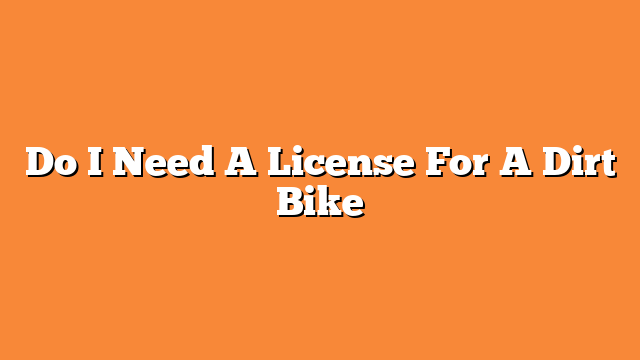Are you considering purchasing a dirt bike but unsure if you need a license to ride one?
The answer is not a simple yes or no, as it depends on various factors such as your intended usage and where you live.
Riding a dirt bike can be an exhilarating experience, but it’s crucial to understand the legal requirements and safety measures involved to avoid any legal consequences or accidents.
Before you hit the dirt trails, it’s essential to research and educates yourself on the necessary licenses and registrations needed to legally operate a dirt bike in your state.
Failure to do so can result in hefty fines, license suspension, or even impounded dirt bikes.
Additionally, riding without proper documentation can put yourself and others at risk, leading to accidents and injuries.
In this article, we’ll guide you through the steps of determining if you need a license for a dirt bike, researching state and local laws, obtaining the necessary licenses and registrations, following safe riding practices, and staying up-to-date on regulations and laws.
Table of Contents
Determine Your Intended Usage of the Dirt Bike
If you’re planning on using your dirt bike primarily for off-road recreational purposes, you won’t need a license to ride it.
However, if you plan on riding your dirt bike on the streets or highways, you will need to obtain a license.
The laws regarding dirt bike usage vary from state to state, so it’s important to do your research and find out what the specific laws are in your area.
Off-road riding refers to riding your dirt bike on trails, tracks, or open fields.
This type of riding is generally considered recreational and does not require a license.
However, if you plan on riding on public land, you may need to obtain a permit or pay a fee.
Competitive ridings, such as motocross or supercross, also falls under the off-road category and does not require a license.
Street riding, on the other hand, refers to riding your dirt bike on public streets or highways.
This type of riding requires a license, as well as registration and insurance for your dirt bike.
It’s important to note that many states have age restrictions for street riding, so if you’re under a certain age, you may not be able to obtain a license for street riding.
Before you hit the road, be sure to familiarize yourself with the laws and regulations in your area to ensure that you’re riding legally and safely.
Research Your State and Local Laws
Before hitting the dirt trails, it’s important that you research your state and local laws regarding dirt bike usage.
Age requirements vary by state, with some allowing riders as young as 8 years old, while others require riders to be at least 16 years old.
Licensing and registration requirements also vary, with some states mandating both, while others only require registration.
Additionally, some states may require insurance for dirt bike usage, so it’s essential to know your state’s specific requirements before you ride.
Age Requirements
You’ll be happy to know that you have to meet certain age requirements to ride a dirt bike legally.
These requirements vary from state to state, so it’s important to check with your local DMV or state’s off-highway vehicle department for specific information.
However, here are some general guidelines to keep in mind:
- Most states require riders to be at least 16 years old to operate a dirt bike on public lands.
- Some states may allow riders as young as 14 to ride with legal guardianship or parental consent.
- There may also be physical limitations, such as height and weight requirements, that riders must meet to operate a dirt bike.
It’s important to note that these age requirements are in place for safety reasons.
Dirt bikes can be dangerous, and younger riders may not have the experience or maturity to handle them properly.
So, if you’re under the legal age to ride a dirt bike, it’s best to wait until you’re old enough and have had proper training before hitting the trails.
Licensing and Registration
Don’t miss out on the opportunity to legally hit the trails with your new dirt bike by ensuring you’ve got the proper licensing and registration requirements taken care of.
In most states, a dirt bike is considered a motor vehicle and therefore requires both a license and registration to operate.
However, there are some licensing exemptions for off-road riding permissions, but it’s important to check with your local DMV or state agency to confirm the rules and regulations in your area.
When it comes to registering your dirt bike, the process varies by state.
In general, you’ll need to provide proof of ownership, such as a bill of sale or title, along with a completed registration form and payment of any fees.
Keep in mind that many states require off-road vehicles to display an identification number or sticker, so be sure to check for any additional requirements.
By taking the time to properly license and register your dirt bike, you can enjoy the thrill of off-road riding while staying on the right side of the law.
Insurance Requirements
To hit the trails with peace of mind, make sure your off-road adventures are covered with insurance.
While most states do not require insurance for dirt bikes, it is still highly recommended to have policy coverage.
Not only does it protect you from financial loss in case of an accident, but it can also cover damage to your bike and medical expenses.
When choosing an insurance policy, make sure to consider liability limits.
This refers to the maximum amount your insurer will pay out in case you cause an accident that results in injuries or property damage to others.
It is important to have enough coverage to protect your assets in case of a lawsuit.
Additionally, some policies may offer optional coverage for theft and vandalism, which can be useful if you store your dirt bike in a public area.
By obtaining insurance coverage, you can enjoy your off-road adventures with peace of mind knowing that you are protected in case of an unforeseen event.
Obtain the Necessary Licenses and Registrations
Once you’ve purchased a dirt bike, it’s important to obtain all necessary licenses and registrations before hitting the trails.
This ensures that you are legally allowed to operate your dirt bike and that you are properly documented in case of an accident.
Here are the three things you need to know about obtaining the necessary licenses and registrations.
- License Exemptions: If you plan on riding your dirt bike solely off-road, you may not need a license.
However, this varies by state and it’s important to check with your local Department of Motor Vehicles (DMV) to see if any exemptions apply to you.
Even if you don’t need a license, it’s still important to have proper documentation, such as your dirt bike registration and proof of insurance.
- Off-Road Riding: If you plan on riding your dirt bike off-road, you may need a special off-road permit or sticker.
Again, this varies by state and it’s important to check with your local DMV to see if any special permits or stickers are required.
These permits or stickers typically help fund the maintenance of off-road trails and parks.
- Dirt Bike Registration: Regardless if you need a license or not, you will need to register your dirt bike with your state’s DMV.
This allows you to legally operate your dirt bike on public roads and trails.
Make sure to bring the necessary documentation, such as proof of ownership and insurance, when registering your dirt bike.
Once your dirt bike is registered, you will receive a license plate or sticker to display on your bike.
Obtaining the necessary licenses and registrations for your dirt bike is crucial before hitting the trails.
Make sure to check with your local DMV to see if any exemptions or special permits are required for off-road riding.
Registering your dirt bike with the DMV allows you to legally operate your bike on public roads and trails, and ensures that you are properly documented in case of an accident.
Follow Safe Riding Practices
When hitting the trails on your new dirt bike, your safety should be your top priority.
One of the best ways to ensure your safety is by wearing the proper gear.
Make sure to wear a DOT-approved helmet, goggles, gloves, boots, and protective clothing.
This gear can help protect you from injuries in case of an accident.
Another important aspect of safe dirt bike riding is mastering proper riding techniques.
This includes basic skills like braking, accelerating, and maneuvering.
It’s also important to learn more advanced techniques like cornering and jumping.
Proper riding techniques not only help keep you safe but also make your ride more enjoyable.
Lastly, it’s important to be mindful of your environmental responsibility and trail etiquette.
Avoid damaging the environment by staying on designated trails and avoiding sensitive areas.
Follow trail etiquette by yielding to other riders and not riding in large groups.
By being responsible and respectful on the trails, we can all help preserve them for future generations to enjoy.
Stay Up-to-Date on Regulations and Laws
Staying up-to-date on regulations and laws is crucial when it comes to riding dirt bikes.
It is important to keep in mind that laws and regulations change over time, so ongoing education and training is necessary.
This involves keeping yourself informed about legal updates and changes, as well as getting involved in advocacy and community involvement to ensure that your voice is heard.
Ongoing Education and Training
Continuing to develop your skills and knowledge through ongoing education and training is crucial for safely operating a dirt bike, whether or not you need a license.
Training benefits include improving your riding techniques, learning about the latest safety measures, and gaining a deeper understanding of the mechanics of a dirt bike.
There are various certification programs available that can provide you with the necessary knowledge and skills to become a safe and responsible dirt bike rider.
One example of a certification program is the Motorcycle Safety Foundation (MSF) DirtBike School.
This program offers hands-on training, classroom instruction, and expert guidance from certified coaches.
The training covers a range of topics, including proper riding gear, bike maintenance, and safe riding techniques.
By completing this program, you can earn a DirtBike School Completion Card, which may be required by some states to operate a dirt bike.
It’s important to note that even if a certification is not required in your state, taking a course like this can greatly improve your knowledge and skills, and ultimately make you a safer rider.
| Training Program | Description | Benefits | Cost |
|---|---|---|---|
| MSF DirtBike School | Hands-on training, classroom instruction, and expert guidance from certified coaches | Improving riding techniques, learning about safety measures and deeper understanding of mechanics | Varies by location, typically ranges from $200-$400 |
| American Motorcyclist Association (AMA) | Offers online courses and in-person training through their sanctioned clubs | Enhance skills and knowledge, gain access to exclusive events and discounts | Membership fees start at $49/year, courses and events vary in cost |
| Trail Rider | Online training program with video tutorials and quizzes | Learn at your own pace, improve skills and knowledge | $39.95 for lifetime access |
By continuing your education and training, you not only enhance your own riding skills but also make the dirt biking community a safer place for everyone.
It’s important to stay up-to-date on the latest regulations and laws, but taking a certification program or online training can provide you with the hands-on experience and knowledge needed to become a confident and safe dirt bike rider.
Legal Updates and Changes
You’ll be surprised to learn about the exciting legal updates and changes affecting the world of off-road riding.
Controversial cases and political influences have resulted in changes in licensing requirements and regulations for dirt bike riders.
Some states have implemented stricter laws, requiring riders to obtain a license and register their dirt bike with the Department of Motor Vehicles.
Failure to comply can result in fines and even the impoundment of the bike.
In addition, there have been changes in the use of public land for off-road riding.
Some areas have been closed off due to environmental concerns, while others have been designated as off-road riding areas with specified rules and regulations.
It’s important to stay up-to-date on these changes, as they can affect where and how you ride your dirt bike.
Make sure to do your research and follow all laws and regulations to ensure a safe and legal off-road riding experience.
Advocacy and Community Involvement
Get involved with local advocacy groups and engage with the off-road riding community to stay informed and make a difference in protecting access to public land for responsible and sustainable riding.
Community outreach is vital in raising awareness and generating support for advocacy campaigns that seek to protect the rights of dirt bike riders.
Advocacy groups often organize events and meetings where riders can learn about the latest legal updates and changes, as well as contribute to advocacy efforts.
By joining these groups and participating in community outreach activities, you can help ensure that your voice is heard and that your rights as a dirt bike rider are protected.
Whether it’s through volunteering, donating, or simply spreading the word, there are many ways to get involved and make a difference in the off-road riding community.
Frequently Asked Questions
How fast can a dirt bike go?
You’re curious about a dirt bike’s top speed and acceleration.
Well, it varies based on the bike’s engine size, gearing, and terrain.
Factors affecting speed include rider weight, wind resistance, and tire pressure.
Always wear proper safety gear when riding.
Can I ride a dirt bike on public roads?
To ride a dirt bike on public roads, you must meet legal requirements and restrictions.
This includes having a valid license, registration, and insurance coverage.
Liability for accidents and damages is also a concern.
What safety gear do I need to wear when riding a dirt bike?
To stay safe when riding a dirt bike, it’s crucial to wear a helmet that meets safety standards.
Additionally, protective clothing like gloves, boots, and body armor can reduce the risk of injury in case of a fall or accident.
Can I ride a dirt bike on private property without a license?
If you are riding a dirt bike on private property with the permission of the landowner, you do not need a license.
However, underage riders may need to be supervised by an adult.
Always wear proper safety gear.
How often do I need to renew my dirt bike registration and license?
To keep your dirt bike registration and license up-to-date, check with your state’s DMV for renewal frequency and costs.
Dirt bike license requirements vary by state, so make sure you’re compliant to avoid penalties.
Conclusion
So, do you need a license for a dirt bike?
The answer is that it depends on your intended usage and your local laws.
If you plan on riding your dirt bike off-road on private property, then you may not need a license or registration.
However, if you plan on riding on public roads or trails, then you will likely need a license and registration.
To ensure that you are riding legally and safely, it is important to research the specific laws and regulations in your state and local area.
You may need to obtain a motorcycle license or endorsement, as well as register your dirt bike with the DMV.
Additionally, you should always follow safe riding practices and wear appropriate protective gear.
By staying up-to-date on the laws and regulations regarding dirt bike usage, you can avoid potential legal issues and ensure that you are riding safely and responsibly.
Remember to always prioritize safety and respect for others while enjoying your dirt bike.







